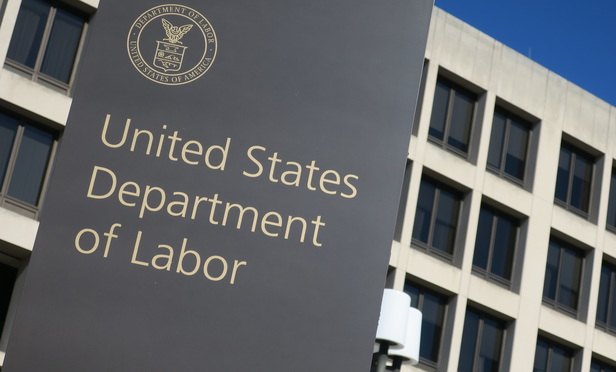 Labor Department headquarters inWashington. (Photo: Mike Scarcella/ALM)
Labor Department headquarters inWashington. (Photo: Mike Scarcella/ALM)
The Labor Department released Thursday its final rule allowing electronic disclosuresof retirement information online or via email.
|"This commonsense rule reflects today's marketplace whileretaining the ability of participants to choose how they receivetheir retirement information," said Preston Rutledge, the assistantsecretary of labor for the Employee Benefits SecurityAdministration.
|Rutledge added on a call with reporters that allowing electronicdisclosures not only permits the use of modern technology but is"more efficient" during the current COVID-19 crisis.
|Rutledge will leave his post at the end of May.
|The rule, drafted in response to President Donald Trump's2018 executive order "Strengthening Retirement Security inAmerica," allows employers to deliver disclosures to planparticipants primarily electronically, which will reduce printing,mailing and related plan costs by an estimated $3.2 billion overthe next decade, Labor said.
|The rule will make disclosures more readily accessible anduseful for participants, but preserves the rights of those whoprefer paper disclosures.
|"The rule will rely on widely available technology to keepworkers and retirees informed about their plans, while stillpreserving the option to receive retirement information by mail,"added Labor Secretary Eugene Scalia, in a statement. "As we lookahead to reinvigorating the American economy, the Department ofLabor's priorities include eliminating unnecessary burdens foremployers that sponsor retirement plans and on addressing the needsof wage earners, job seekers, and retirees."
|The final rule allows retirement plan administrators to furnishcertain required disclosures using the proposed "notice-and-access"model, Labor said.
|Retirement plan administrators can use email to send disclosuresdirectly to participants. "These administrators must notify planparticipants about the online disclosures, provide information onhow to access the disclosures, and inform participants of theirrights to request paper or opt out completely," Labor said.
|The new rule also includes additional protections for retirementsavers, such as accessibility and readability standards for onlinedisclosures and system checks for invalid electronic addresses.
|Susan Neely, president and CEO of the American Councilof Life Insurers, said that the rule couldn't come at a bettertime. "People are conducting business all the time over theirphones and through other technologies," she said in a statement."Digital capabilities are more important all the time and that'sbeen amplified by COVID-19. It only makes sense for peopleto have access to information about their retirement plans whenthey want it, wherever they are.
|Labor's rule also "does a good job of addressing preferences ofall plan participants by protecting those who prefer traditionalpaper."
|— Related on ThinkAdvisor:
Complete your profile to continue reading and get FREE access to BenefitsPRO, part of your ALM digital membership.
Your access to unlimited BenefitsPRO content isn’t changing.
Once you are an ALM digital member, you’ll receive:
- Critical BenefitsPRO information including cutting edge post-reform success strategies, access to educational webcasts and videos, resources from industry leaders, and informative Newsletters.
- Exclusive discounts on ALM, BenefitsPRO magazine and BenefitsPRO.com events
- Access to other award-winning ALM websites including ThinkAdvisor.com and Law.com
Already have an account? Sign In
© 2024 ALM Global, LLC, All Rights Reserved. Request academic re-use from www.copyright.com. All other uses, submit a request to [email protected]. For more information visit Asset & Logo Licensing.








